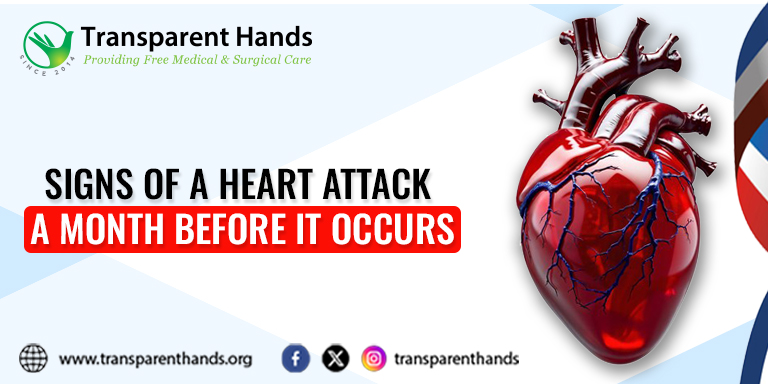Alarming Signs of a Heart Attack a Month Before It Occurs

Myocardial infarctions, commonly known as heart attacks, are associated with sudden chest pain. According to the Centers for Disease Control, approximately 805,000 Americans experience a heart attack annually. Of these, 605,000 are first-time occurrences, while 200,000 affect individuals with a history of heart attacks.
Heart attack symptoms can vary. Some cases have immediate symptoms, while others develop gradually over days, weeks, or even up to a month before it can trigger a heart attack. Research shows that in the United States, an individual dies of a heart attack every 40 seconds.
The body often provides subtle warning signs in the form of symptoms that shouldn’t be overlooked, yet many people fail to recognize these important signals. Listed below are some symptoms that can appear a month before a heart attack.
The 6 Warning Signs of a Heart Attack a Month Before
Unusual Fatigue
One of the most common and early signs of a heart attack, especially in women, is unexplained or unusual fatigue. Unusual fatigue differs from typical tiredness caused by busy schedules or sleep deprivation. If the fatigue increases even more with physical activity than usual, it may be an indication of heart failure.
When the human body struggles with reduced blood flow, it redirects the energy to vital organs, which may make you feel drained. A study of heart attack survivors, involving women aged 20 to 97, revealed that unusual or unexplained fatigue was the most frequently reported symptom. Approximately 71% of participants experienced this warning sign.
Shortness of Breath
Dyspnea is the medical term for shortness of breath. It occurs when your heart is not pumping enough blood throughout your body. As a result, your body tries to compensate by breathing faster. This increased breathing rate aims to get more oxygen into your system, which makes you feel short of breath. Feeling short of breath due to an activity that did not provoke this symptom in the past, suggests narrowed coronary arteries. This can eventually lead to a heart attack.
According to the American Heart Association, people who reported the lowest level of shortness of breath had a 30% higher chance of having a heart attack in the next 30 years. Whereas, those who reported the highest level of shortness of breath were more than twice as likely to have a heart attack.
Nausea
Nausea can be an early sign of a heart attack. Experiencing cold sweats, feeling sick, and vomiting could be signs of a silent heart attack. Nausea, along with other heart attack symptoms such as mild chest pressure, jaw pain, neck pain, and excessive tiredness should not be dismissed.
A study of 265 patients mentioned by the National Institute of Health reported that nausea or vomiting can be a strong indicator of heart attack. Patients experiencing these symptoms had a 3.14 times higher chance of having a heart attack compared to those without such symptoms.
Sleep Disorder
Having trouble sleeping can be an early sign of heart trouble. Sleep disorders such as apnea and insomnia can lead to heart-related problems like a heart attack. Sleep gives the body the time to restore and recharge. A sleep shortfall triggers physiological and hormonal changes, elevating blood pressure and sugar, which can ultimately raise the risk of a heart attack.
According to the American College of Cardiology, people who suffer from insomnia are 69% more likely to experience a heart attack. Furthermore, research shows that people who get five or fewer hours of sleep per night have an increased risk of getting a heart attack. Getting adequate sleep prevents damage to your cardiovascular health.
Chest Pain
Chest pain is one of the major symptoms of an impending heart attack. A chest pain that can possibly indicate a heart attack feels like pain in the center of the chest. It can be described as squeezing, fullness, burning, tightness, or uncomfortable pressure. In this case, doctors perform an Electrocardiogram (ECG) and a blood test, cardiac troponin.
Chest pain that could indicate a heart attack often starts gradually over a few minutes. This pain may then spread to the left arm, neck, jaw, or back. Research shows that every 2 in 3 people have chest pain when they experience a heart attack.
Conclusion
Understanding the early symptoms of heart attack can be life-saving. A survey shows patients have different symptoms a month prior to a heart attack. The most common symptoms included shortness of breath (42%), unusual fatigue (71%), and sleep disturbance (48%).
As stated by the Centers for Disease Control, about 1 in 5 heart attacks are silent. The damage can be irreversible and the person is not even aware of it. In case of a situation where you experience such symptoms, it is vital to consult a healthcare provider to avoid any future problematic cardiac events.
Transparent Hands not only focuses on raising awareness about the signs of heart attacks through preventive healthcare sessions at our free medical camps but also provides life-saving surgeries and medical procedures to deserving heart patients. Explore stories of cardiac patients in Pakistan on Transparent Hands and make a lasting impact. Contribute now.











Leave Your Comments